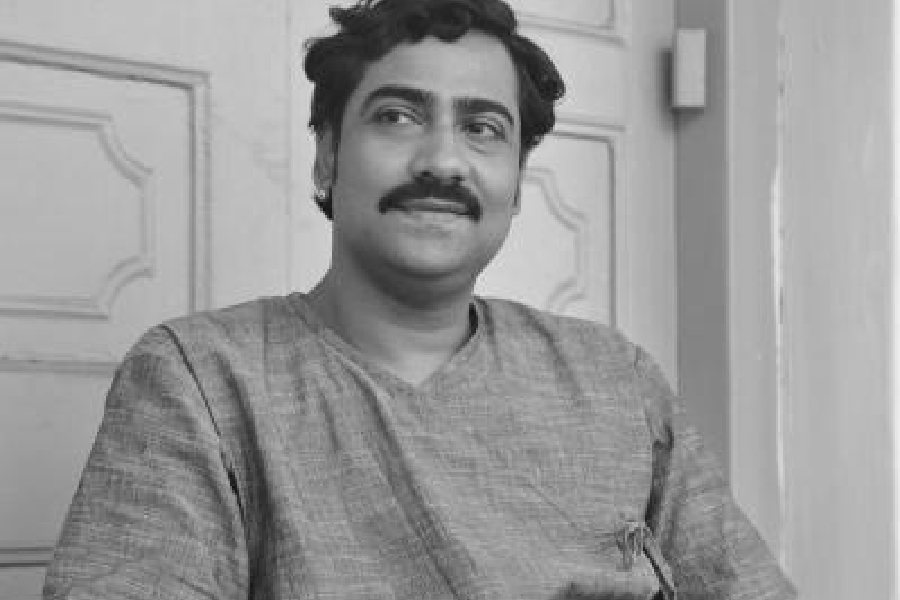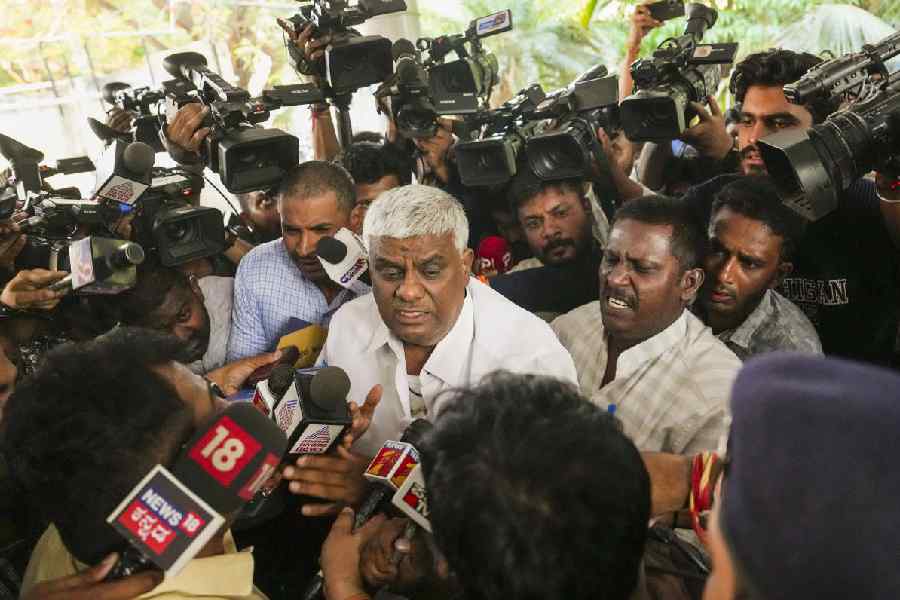In William Shakespeare’s Hamlet, a group of actors play a significant role in convincing the Prince of Denmark of his uncle’s guilt in the murder of his father. It was those characters — going hungry for lack of work — that sparked Kaushik Sen’s interest in staging his reimagining of the play.
In the pandemic-induced lockdown, Sen’s theatre group Swapnasandhani was one of many that got together to form the organisation Subhratitya, which raised funds to pay more than 200 theatre workers every month for one-and-a-half years. People who would otherwise have starved for lack of work.
The pandemic also became another reason for him to choose Hamlet, says Sen. Shakespeare wrote it even as the Great Plague raged in London.
In Sen’s play, Hamlet’s dead father is a Communist leader. He exhorts Hamlet to fight for the rights of the exploited, saying he has nothing to lose except his chains, while the Communist anthem, The Internationale, plays in the background. Hamlet’s murderous uncle, Claudius, is a Capitalist. “To me, Hamlet represents a young man walking the thin line between these two worlds. Of course, these days the world is no longer just bipolar and I think that is a good thing,” says Sen.
Sen himself comes from a dedicated Communist family and for many years believed Stalin was a hero who could do no wrong. He has now lost his Communist glasses, but still believes in Left-wing ideology. Not that it stopped him from speaking up against the Left Front government in Bengal after the Nandigram killings in 2007 or that time when he travelled to Lalgarh in 2009 to see the situation for himself. Not even when Swapnasandhani faced a sudden drop in call shows — invited performances — from more than 35 to barely four a year. This was all happening in pre-Trinamul Bengal.
Today, Sen is just as critical of the current governments in the state and at the Centre. He says, “Narendra Modi doesn’t have the greatest human rights record but America is making a great deal of him because they need India if they want to fight China. They are welcoming Modi knowing very well that this man is ruining the pillars upholding Indian democracy.” This sense of a world wherein everyone is using everyone else for selfish purposes is reflected in Shakespeare’s Hamlet. Every character is like that except for the Prince of Denmark himself, who Sen calls an “anomaly”.
Sen makes a virtue of Hamlet’s dithering. “Humans can’t take revenge that easily; Hamlet can’t.”
Why can’t he? What stops him? As Sen sees it, Hamlet does not want to be part of the violent world he inhabits; that is why he thinks it over, he delays. That is not his weakness, it is his strength, says Sen. “This whole fact that I do not want to but I am becoming part of a violent world, that is what makes Hamlet relevant,” he adds.
Every play Sen stages — “be it Shakespeare or Molliere or Chekov” — he wants it to be a reflection of its time. “That is what I aim for. That is something I firmly believe in,” he says.
Sen has a respectable body of work on-screen too — both in film and television. Till June this year, he was playing the lead in a popular Bengali soap. Despite the amount of screen time he has under his belt, Sen is emphatic that his true home is theatre. “Without theatre, I have no relevance. Unfortunately, my home, the world of theatre, is unable to feed me. That is the only reason I stray,” says the man who has acted in films directed by Mrinal Sen, Tapan Sinha, Tarun Majumder, Aparna Sen and even the current crop of directors like Kaushik Ganguly, Suman Ghosh and Srijit.
Has he ever thought of directing a film? “Absolutely not,” says Sen with conviction. He continues, “Making a good movie takes a special skill. Just acting well in a film doesn’t guarantee you can become a director. That is why Soumitra Chatterjee never tried his hand at film direction.” That said, the senior actor believes his son Riddhi, who has acted in quite a few films, has that special skill.
Riddhi also plays the title role in Hamlet. Sen plays Claudius, the murdering uncle. His wife Reshmi, whom Sen credits with giving him the reading habit, plays Hamlet’s mother Gertrude.
For Sen, theatre is a social experience. “Theatre gives you a sense of collectivity. Young people come to the theatre from a feeling of loneliness,” he says.
He continues about how the seats in an auditorium are not as comfortable as those in a cineplex, forcing people to sit shoulder-to-shoulder with strangers. As the hall lights fade out and the stage is lit up, unknowingly, one becomes a part of the greater audience. “You experience a play by yourself but at the same time together. This is theatre’s biggest piece of magic.”
Sen adds, “More people are now coming to watch plays, rather than films, because of that magic, because of this feeling of togetherness.”










